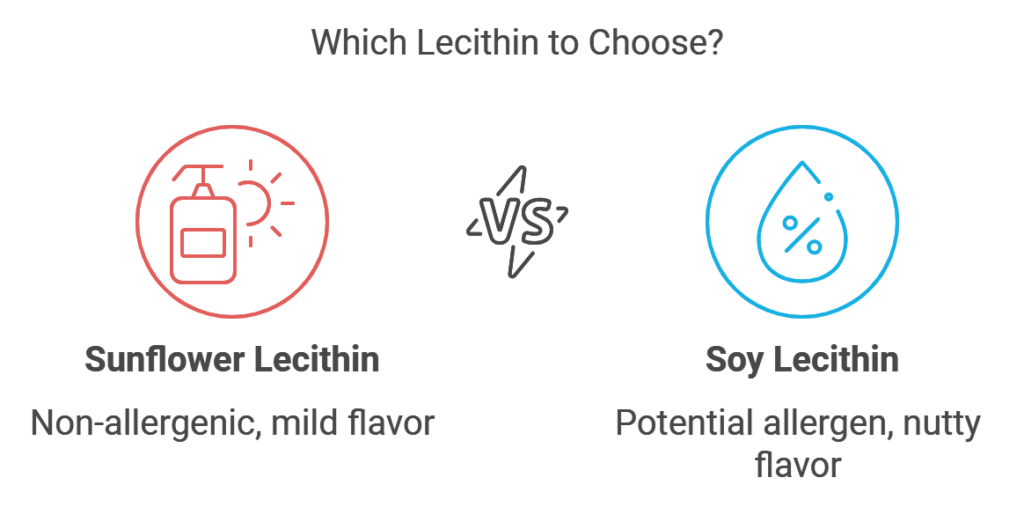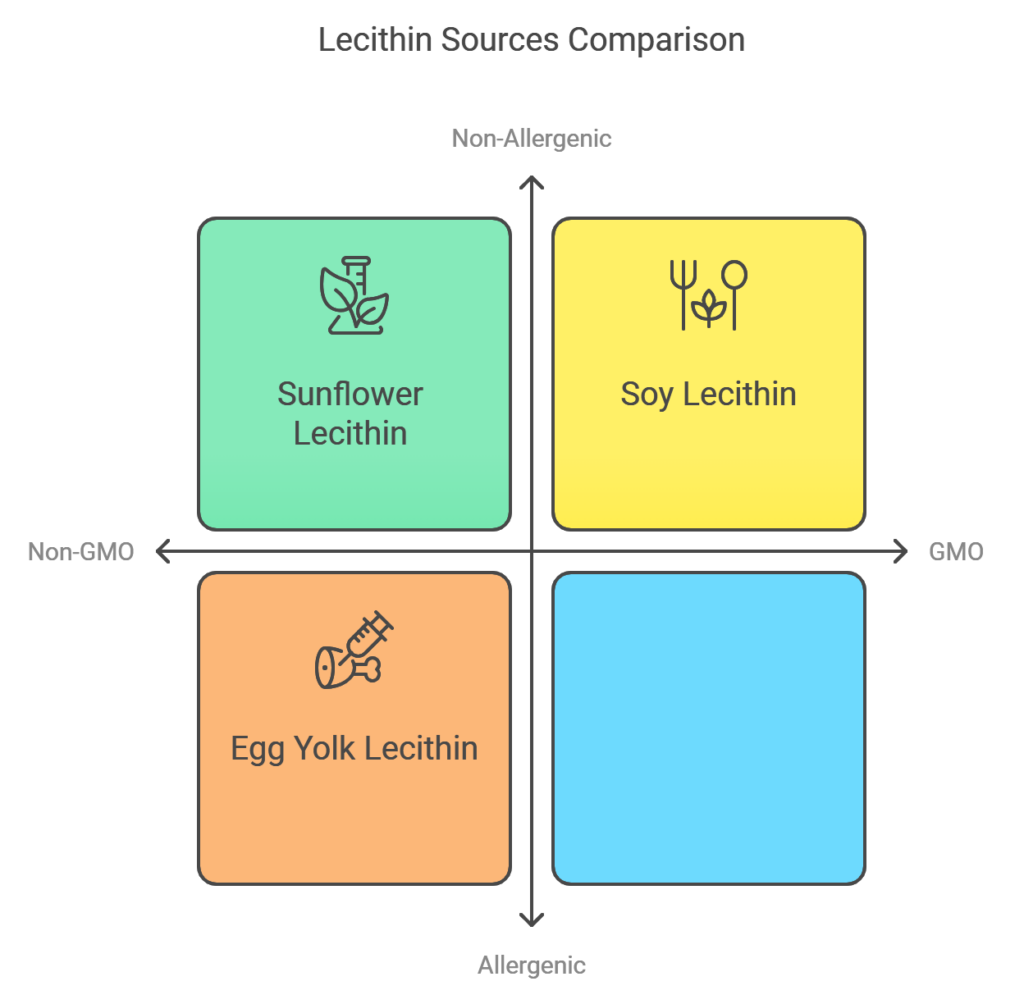
What Is Sunflower Lecithin?
Sunflower lecithin is a natural substance extracted from sunflower seeds. It’s a type of fat known as a phospholipid, which is crucial in building cell membranes. Unlike soy lecithin, sunflower lecithin is extracted without chemicals, making it a preferred food additive in the food industry for those seeking a more natural product.
Benefits of Sunflower Lecithin
Sunflower lecithin offers a range of health benefits:
- Cardiovascular Health: Helps lower LDL cholesterol levels, reducing the risk of heart disease.
- Cognitive Function: Supports brain health by providing essential fatty acids.
- Digestive Health: Aids alleviates digestive issues like irritable bowel syndrome and ulcerative colitis.
- Liver Health: Assists in managing liver disease by improving fat metabolism.
- Skin Hydration: Acts as a protective barrier, enhancing skin moisture.
Unique Features of Sunflower Lecithin
- Non-Allergenic: Ideal for those with soy allergies, as it’s a soy-free alternative.
- Natural Extraction: Obtained through cold pressing, preserving its active ingredients.
- Neutral Taste: Easily incorporated into foods without altering flavor.
- Versatile Form: Available in powder, capsule, and liquid forms.

Sunflower Lecithin in Breastfeeding
For breastfeeding mothers, sunflower lecithin can be a game-changer.
- Prevents Clogged Milk Ducts: Helps reduce the viscosity of breast milk, preventing blockages.
- Experts recommend it for lactating mothers: organizations like the Canadian Breastfeeding Foundation.
Usage and Dosage Guidelines
- General Dosage: Typically, 1,200 mg is taken 3-4 times daily.
- Form Selection: Choose between sunflower lecithin powder or capsule form based on convenience.
- Consult Healthcare Provider: Discuss with a qualified healthcare professional before starting any supplement.
Side Effects and Allergies
While sunflower lecithin is generally safe, be aware of possible side effects:
- Allergic Reactions: Rare but can include stomach aches or skin rashes.
- High Doses: This may lead to digestive issues like diarrhea.
- Interactions: Consult a doctor if you’re on medications, especially for high blood pressure or cholesterol levels.
Sunflower Lecithin During Pregnancy
- Safety First: Limited research is available; pregnant women should consult their healthcare provider.
- Potential Benefits: It may aid in reducing high cholesterol and supporting liver function.
Target Audience for Sunflower Lecithin
- Health Enthusiasts: those aiming to improve cardiovascular health and manage cholesterol levels.
- Breastfeeding Mothers: Seeking solutions for milk duct issues.
- Individuals with allergies: those allergic to soy products or seeking soy protein alternatives.
- People with Digestive Concerns: individuals with irritable bowel syndrome or ulcerative colitis.
Product Satisfaction and Refund Policies
When investing in sunflower lecithin products, knowing the customer satisfaction guarantees and refund policies retailers or manufacturers offer is essential. Reputable companies often stand behind their products, providing full or partial refunds if you’re unsatisfied.
This ensures you can try the product confidently and reflects the manufacturer’s commitment to quality. Review the seller’s refund policy before purchasing primarily online to understand the terms and conditions. This will help you make an informed decision and ensure a smooth process should you return or exchange the product.

To Buy Sunflower Lecithin Products Online on Amazon, Click Here!
Prop 65 and Safety Concerns
When purchasing sunflower lecithin products, especially in the United States, you might encounter a Proposition 65 warning label. Understanding what this means can help you make informed decisions about product safety and regulatory compliance.
Understanding Proposition 65
- California Law: Proposition 65, officially known as the Safe Drinking Water and Toxic Enforcement Act of 1986, is a California law to protect consumers from harmful chemicals.
- Right-to-Know Law: It’s often called a right-to-know law because it mandates businesses to inform Californians about significant exposures to chemicals that cause cancer, birth defects, or other reproductive harm.
- Prop 65 Chemical List: The law maintains a list of chemicals, including lead and cadmium, sometimes found in trace amounts in natural products like sunflower lecithin.
Implications for Sunflower Lecithin Products
- Consumer Warning: Products containing chemicals above the safe harbor levels must display a consumer warning label to comply with Prop 65-compliant practices.
- Naturally Occurring Allowance Exception: Some products may qualify for exceptions if the chemicals are naturally occurring and below certain thresholds. However, many companies opt to include the warning to avoid legal issues.
- Testing Protocols: Reputable manufacturers employ rigorous testing protocols to ensure their products meet safety standards and GMP-compliant practices.
Safety Considerations
- Lead and cadmium are two heavy metals that can enter sunflower lecithin through plant absorption from the soil. However, the amounts are typically minimal.
- Regulatory Compliance: Companies adhere to both federal regulations and Prop 65 to ensure consumer safety.
- Prop 65-Compliant Practices: Manufacturers often take extra steps to minimize the presence of listed chemicals, adhering to strict GMP-compliant practices.
What Does This Mean for You?
- Informed Choice: A Proposition 65 warning doesn’t necessarily mean a product is unsafe. It indicates compliance with California law and transparency about potential exposures.
- Further Research: If concerned, contact the manufacturer for detailed information on their testing protocols and safety measures.
- Risk Assessment: Understand that trace chemicals like lead and cadmium are common in many natural products due to environmental factors.
Being aware of Proposition 65 and its implications helps you make informed decisions about the sunflower lecithin products you choose. Consider the benefits and potential risks, and consult with a healthcare provider if you have specific health concerns.
FAQs
What is sunflower lecithin used for?
Sunflower lecithin is used as a dietary supplement to support heart health, improve cognitive function, and aid in digestion. It’s also a natural emulsifier in food production.
What does sunflower lecithin do?
It helps lower LDL cholesterol, supports nervous system function, and acts as a natural emulsifier, improving the texture and shelf life of food products.
Is sunflower lecithin bad for you?
Generally, it’s safe for most people. However, high doses may cause adverse reactions like digestive discomfort. Always consult a healthcare provider before use.
Where can I buy sunflower lecithin?
It’s available at health food stores, pharmacies, and online retailers specializing in dietary supplements.
Reputable Sources:
- National Institutes of Health (NIH) Office of Dietary Supplements
- Title: “Lecithin”
- Link: https://ods.od.nih.gov/factsheets/Lecithin-Consumer/
- Provides comprehensive information on lecithin as a dietary supplement, including its uses and safety considerations.
- U.S. Food and Drug Administration (FDA)
- Title: “FDA Regulation of Dietary Supplements”
- Link: https://www.fda.gov/food/dietary-supplements
- Offers regulatory information and safety guidelines on dietary supplements like sunflower lecithin.
- Centers for Disease Control and Prevention (CDC)
- Title: “Breastfeeding: Recommendations and Guidelines”
- Link: https://www.cdc.gov/breastfeeding/index.htm
- Provides guidelines for breastfeeding mothers, including information on supplements and medications.
- California Office of Environmental Health Hazard Assessment (OEHHA)
- Title: “Proposition 65 (The Safe Drinking Water and Toxic Enforcement Act of 1986)”
- Link: https://oehha.ca.gov/proposition-65
- Details about Proposition 65 warnings, chemicals listed, and compliance requirements related to consumer products.
- European Food Safety Authority (EFSA)
- Title: “Scientific Opinion on the Safety of Lecithins (E 322) as a Food Additive”
- Link: https://www.efsa.europa.eu/en/efsajournal/pub/1144
- Offers scientific evaluations on the safety of lecithin used in food products.
- Health Canada
- Title: “Lecithin Monograph”
- Link: https://www.canada.ca/en/health-canada/services/drugs-health-products/natural-non-prescription/legislation-guidelines/guidance-documents/lecithin.html
- Provides information on lecithin as a natural health product, including recommended uses and safety.
- World Health Organization (WHO)
- Title: “Evaluation of Certain Food Additives”
- Link: https://apps.who.int/food-additives-contaminants-jecfa-database/chemical.aspx?chemID=2637
- Contains safety evaluations of lecithin as a food additive.
- National Library of Medicine (NLM) – MedlinePlus
- Title: “Lecithin Information”
- Link: https://medlineplus.gov/druginfo/natural/1015.html
- Offers detailed information on the uses, side effects, and interactions of lecithin supplements.
- Environmental Protection Agency (EPA)
- Title: “Lead Compounds Hazard Summary”
- Link: https://www.epa.gov/sites/default/files/2016-09/documents/lead_compounds.pdf
- Provides information on lead exposure risks, relevant to Prop 65 safety concerns.
- United Nations Food and Agriculture Organization (FAO)
- Title: “Compendium of Food Additive Specifications: Lecithins”
- Link: http://www.fao.org/3/a-a0675e.pdf
- Contains international standards and specifications for lecithin used in food.
Conclusion
Sunflower lecithin is a versatile supplement with numerous benefits, from supporting heart health to aiding breastfeeding mothers. Its natural extraction process and non-allergenic properties make it a preferred choice for many.
We’d love to hear from you! Share your sunflower lecithin tips or experiences in the comments below. Don’t forget to subscribe to our newsletter for more healthy living insights!








